By Brett Milano on Trombone Shorty 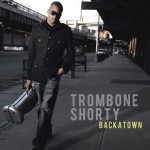 It didn’t take a genius to peg Troy “Trombone Shorty” Andrews as a national success waiting to happen. He’s young, good-looking and a born entertainer, he was also making credible jazz records when he was barely out of puberty. His roots are in the Treme Brass Band circuit—which, if the HBO series Treme does its bit, will soon be in the national consciousness. But Andrews has already played to arenas, touring in Lenny Kravitz’s band and playing in the U2/Green Day number at the 2006 Saints home opener. All someone had to do was make a capital-C crossover album—maybe with a brass-hop version of “St. James Infirmary” on it—and wait for the money to roll in. It didn’t take a genius to peg Troy “Trombone Shorty” Andrews as a national success waiting to happen. He’s young, good-looking and a born entertainer, he was also making credible jazz records when he was barely out of puberty. His roots are in the Treme Brass Band circuit—which, if the HBO series Treme does its bit, will soon be in the national consciousness. But Andrews has already played to arenas, touring in Lenny Kravitz’s band and playing in the U2/Green Day number at the 2006 Saints home opener. All someone had to do was make a capital-C crossover album—maybe with a brass-hop version of “St. James Infirmary” on it—and wait for the money to roll in.
Backatown is definitely not that album, nor is it necessarily the one you’d expect from his live shows, which ride heavily on extended party jams. It’s a crossover set, but a creative one that doesn’t play to the tourists alone. Galactic’s Ben Ellman produces, and it’s up the same general alley as Galactic’s Ya-Ka-May, which placed loops, samples and bounce beats within the New Orleans R&B tradition. Backatown’s title track is clearly a studio creation with its looped drums, echoed guitar and synths, and a horn line that sounds flown in from a different recording, capped by a brief but fiery trombone solo. It sounds lively and catchy instead of overloaded, like one of those lucky accidents when two houses leave their windows open and the results mesh. The cut-and-paste approach also works for the disc’s one familiar tune, Allen Toussaint’s “On Your Way Down.” There wasn’t much need for another faithful version of the song (Elvis Costello and Little Feat both nailed it in different decades) and this one (with Toussaint’s own piano at the heart of the mix) updates the groove and reworks the melody without losing the message, throwing some nifty “Shaft”- style flute into the bargain. Kravitz’s influence is clear on the other vocal tracks: “Something Beautiful” is the kind of Stevie Wonder/EWF homage that made Kravitz’s name, but sounds more like a hit than anything on his last two albums. If there’s a problem here, it’s that Andrews and the band never stretch out. The longest of the 14 tracks on Backatown is 3:46—unheard-of brevity for nearly any modern album, much less a funk-based one. The power-chord driven “Suburbia” demands more than the three minutes it gets; “928 Horn Jam” has all the makings of a raucous old-school finale, but cuts off after 40 seconds. Maybe this is another nod to the Galactic audience, which figures that live tapes are for trading and that studio albums are the place to break ground. |
|
By Alex Rawls on Sam Williams 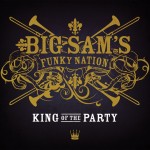 Big Sam’s Funky Nation is not going to confuse you. On King of the Party, Sam Williams and company pick up the funk-rock blend that Trombone Shorty and Bonerama have been toying with and puts it in your face. Guitars on 10, arena rock drums and the horns blaring like they’re in the phone booth with you. No idea is complicated; when Sam wants to get funky, the Nation goes into James Brown mode for the unfortunately-titled “Krunked Up” (When grandmothers spoke of “getting krunk” during the playoffs, “krunk” lost all hip cred—if it had any left). When Sam wants to party, he declares himself the king of the party in the title cut then backs it up. Big Sam’s Funky Nation is not going to confuse you. On King of the Party, Sam Williams and company pick up the funk-rock blend that Trombone Shorty and Bonerama have been toying with and puts it in your face. Guitars on 10, arena rock drums and the horns blaring like they’re in the phone booth with you. No idea is complicated; when Sam wants to get funky, the Nation goes into James Brown mode for the unfortunately-titled “Krunked Up” (When grandmothers spoke of “getting krunk” during the playoffs, “krunk” lost all hip cred—if it had any left). When Sam wants to party, he declares himself the king of the party in the title cut then backs it up.
As you can imagine, we’re not going to learn life lessons from Big Sam’s lyrics, but this is visceral music. It’s made to be felt, not thought about, and as long as nothing’s off-puttingly dumb, it works. And nothing is; in fact, “See Me Dance” is a charming bit of self-mythologizing and one of the most compelling songs on the album. King of the Party works because Big Sam knows who he is as a musician and embraces it. His charisma, exuberance and sense of joy translate to the album, which is good because they keep you hooked despite frustratingly low vocal levels throughout. On one track, it sounds like he’s singing through a CB radio, but the air of fun is such that even his dalliance with AutoTune is amusing. |
|
By John Swenson on rock 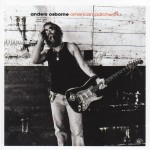 The rock era is pushing 60 and anyone who’s been listening carefully will have to admit that enthusiasm for contemporary releases can never include any believable claims of originality. That’s okay because much of the best rock is artful theft anyway. There remains plenty of room for personal expression, however, and there’s always a place for great songwriting. The rock era is pushing 60 and anyone who’s been listening carefully will have to admit that enthusiasm for contemporary releases can never include any believable claims of originality. That’s okay because much of the best rock is artful theft anyway. There remains plenty of room for personal expression, however, and there’s always a place for great songwriting.
Which brings us to Anders Osborne. His gifts as a guitar player are significant, and if one is led to make comparisons to Duane Allman, that’s hardly a negative. There are only so many notes that can be phrased so many different ways. But the human voice is something else; no two are the same. When that unique voice is used in service of personal expression so emotionally intense it feels like an explosion, you’ve really got something special. American Patchwork is the album Osborne fans have been waiting for since Ash Wednesday Blues. The record is a triumph in several ways— as a coherent musical statement, as an account of one man’s struggle to transcend his own existential problems, as a tale of New Orleans loss and recovery, as a rumination on the entropic inevitability of death and a possible redemption by love. The back story is that it’s an album about recovery from substance abuse, but to leave it at that is like saying John Lennon/Plastic Ono Band was an album about primal therapy. Osborne contrasts electric and acoustic modes artfully to express the roller coaster of emotions he takes us through on American Patchwork. The record begins with the ominous buzzing of multi-layered guitars that lead us “On the Road to Charlie Parker,” a hair-raising metaphor for genius cut down at the knees by heroin. Osborne keeps it terse and focused, adding to the drama by not overplaying it. He steps aside on track two to comment almost dispassionately on his condition as he sings the tuneful chorus of “Echoes of My Sins,” a song delivered here as a crunching electric shuffle but which sounds as if it could easily be sung as a straight pop melody. Osborne contrasts his horror with the first of the redemptive tracks on the album, the simple reggae love song “Got Your Heart.” But Osborne is always an emotional recidivist, and we’re immediately plunged into the nightmare of “Killing Each Other.” The bad vibes continue as Osborne contemplates a desultory escape on “Acapulco,” a song about Mexico that Kenny Chesney will never record, then he offers a heartbroken tribute to a fallen friend on the remarkable hymn “Standing With Angels.” The line “You’re done raging against the light” sums up the condition Osborne is writing about with remarkable eloquence. In this chapter of Osborne’s life, there is a decidedly happy ending, expressed in the simple love songs that end the album, “Meet Me in New Mexico” and “Call On Me.” Can one man’s search for salvation discover a redemptive path for a ruined city, an imperiled country, a world perpetually on the brink of disaster? Anders Osborne is not posing that question, but after living with American Patchwork for weeks now I can’t stop asking it myself. The album describes a process—the writer of these songs is balancing the baggage of what can’t be changed against the possibilities that lie ahead, all by wrestling with his emotions in the here and now. His personal experiences become universal observations in these songs, and the listener, by living vicariously through them, can confront his own demons. That’s not an original process, but it’s the living definition of great art. |
|
By Aaron LaFont on Threadhead 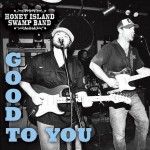 Maybe it’s because they formed in San Francisco; or maybe it’s because they seem more like a family than a band; or maybe it’s because of Chris Mulé’s lyrical guitar leads and Aaron Wilkinson’s raspy Bob Weir-like yowl, but the Honey Island Swamp Band’s gritty, bustling grooves recall mid- Seventies-era Grateful Dead—except these Big Easy boys spice things up with a splash of southern soul. Nearly a year removed from the release of their debut, Wishing Well, the band named after the marshlands just to the northeast of the Big Easy doesn’t miss a beat on their latest effort, Good to You, a sweltering, sunstreaked affair that sneaks up on you like a slow-rolling breeze on a sticky, summer afternoon. Maybe it’s because they formed in San Francisco; or maybe it’s because they seem more like a family than a band; or maybe it’s because of Chris Mulé’s lyrical guitar leads and Aaron Wilkinson’s raspy Bob Weir-like yowl, but the Honey Island Swamp Band’s gritty, bustling grooves recall mid- Seventies-era Grateful Dead—except these Big Easy boys spice things up with a splash of southern soul. Nearly a year removed from the release of their debut, Wishing Well, the band named after the marshlands just to the northeast of the Big Easy doesn’t miss a beat on their latest effort, Good to You, a sweltering, sunstreaked affair that sneaks up on you like a slow-rolling breeze on a sticky, summer afternoon.
Once again, the team of Wilkinson and Mulé split the songwriting and vocal duties, with Wilkinson at the helm for eight of the disc’s 13 tracks. His songs bear a looser, more rootsy feel, whereas Mulé’s tracks are steeped in soul and R&B. From the sizzling strut of “Chocolate Cake” to the relaxed ride of “Lose that Girl” to the swamp-rock swing of “Country Girl,” any which way you slice it, Good to You’s driving, working-man’s blues and soulful, honky-tonk shuffles make for some of the tastiest tunes coming out of the Crescent City today. “Rod n’ Reel,” the album’s best song, boasts the lines, “Some folks high on cocaine / Some folks stuck on weed / I’m hooked on my baby she’s got the only thing I need.” Now there’s a verse even Dead lyricist Robert Hunter would have been proud to pen. |
|
By Tom McDermott on tuba 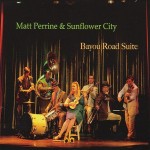 New Orleans locals are familiar with sousaphonist Matt Perrine playing any style in any situation. His virtuosity brings forth the inevitable “I’ve never heard a tuba played like that” comment; then you take it for granted until you hear another tuba player. New Orleans locals are familiar with sousaphonist Matt Perrine playing any style in any situation. His virtuosity brings forth the inevitable “I’ve never heard a tuba played like that” comment; then you take it for granted until you hear another tuba player.
Less noticeable, but apparent to his bandmates, are Perrine’s arranging and composing chops. He writes music as ably as anyone living in New Orleans, and at his best can be lumped in with the most sophisticated of our city’s expat player/arrangers: Wynton, Harry Jr., and Nicholas Payton. The core of the Sunflower City band featured here is a delicious mix: banjoist Alex McMurray, fiddler Matt Rhody, Perrine on sousaphone and Ben Schenck, who has never sounded better, on clarinet. Add percussion by Michael Skinkus or Carlo Nuccio, and you have a unique timbre on chamber jazz pieces like “Rooster,” or the Joplinesque “Nocturne.” Skinkus, in fact, must be accorded star sideman status for his additional work on “Sougouya,” where he adds some Cuban sabor to a West African feel, as well as his pandeiro and cuica playing on the Brazilian “I’m Not Choro.” As Perrine’s debut album demonstrated, he has a flair for Trinidadian calypso, and “My Goat,” written and sung with panache by St. Louis Slim, may be the most loveable track here. This Latinate material is exceptional, but in fact, Bayou Road Suite is more trad-jazzish than his debut from 2007, Sunflower City. As Perrine explains, “I just started writing trad material and couldn’t stop.” From Trinidad to West Africa to Brazil and back to New Orleans: it’s quite a ride. Perrine’s first album was exceptionally well-received and there’s no reason to think Bayou Road Suite won’t exceed these expectations. With his playing, arranging and composing, he continues to raise the bar for traditional music with a New Orleans flavor. |
|
By Dan Willging on zydeco 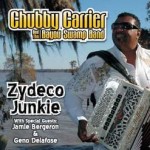 Chubby Carrier has spent a career perfecting his party package live shows, so it stands to reason that this would be more of the same, right? No, not quite. Carrier does do his best job ever reaching out to a diverse demographic with a variety of hooks. The breezy dance rendition of Bad Company’s “Feel Like Makin’ Love” will likely appeal to aging, knock-kneed rockers. On “My Zydeco Shoes,” modern country devotees will give thumbs up to Jamie Bergeron’s Nashville-radio-ready vocals. Additionally, there’s guitar-cranked funk, a peppy instrumental and poignant R&B. Carrier’s singing is much more focused this time out; the background vocals are full, crisp and tight while the Ivan Klisanin-engineered sound has the bottom-end smacking hard like it’s supposed to. Chubby Carrier has spent a career perfecting his party package live shows, so it stands to reason that this would be more of the same, right? No, not quite. Carrier does do his best job ever reaching out to a diverse demographic with a variety of hooks. The breezy dance rendition of Bad Company’s “Feel Like Makin’ Love” will likely appeal to aging, knock-kneed rockers. On “My Zydeco Shoes,” modern country devotees will give thumbs up to Jamie Bergeron’s Nashville-radio-ready vocals. Additionally, there’s guitar-cranked funk, a peppy instrumental and poignant R&B. Carrier’s singing is much more focused this time out; the background vocals are full, crisp and tight while the Ivan Klisanin-engineered sound has the bottom-end smacking hard like it’s supposed to.
But keep in mind that while Carrier’s a third-generation zydeco musician, he’s not bound by his cultural music. The album’s biggest surprise arrives on “Touch Me Touch Me Baby.” Keyboardist Keith Clement alternates classic New Orleans piano fill-in with enchanting salsa melodies. Smart move, because if zydeco is going to continue to flourish, it needs more alliances with like-minded genres. Experimental fusion is encouraged and this is a step in the right direction. |
|
By Aaron LaFont on Vital Signs  There’s a fine line between a jam band and a band that jams. New Orleans’ the Revivalists fall into the latter category. The group burst onto the scene in 2008 and honed their chops in 2009, expanding their live set as well as their songbook in the process. After spending some time in the studio, they return with Vital Signs, an album that brims with soulful melodies, explosive jams, and down-home rock ’n’ roll. There’s a fine line between a jam band and a band that jams. New Orleans’ the Revivalists fall into the latter category. The group burst onto the scene in 2008 and honed their chops in 2009, expanding their live set as well as their songbook in the process. After spending some time in the studio, they return with Vital Signs, an album that brims with soulful melodies, explosive jams, and down-home rock ’n’ roll.
Singer Dave Shaw delivers an especially powerful performance here. His husky, fervent wail goes perfectly with the locomotive groove of “Ride the Earth,” a propulsive number whose lively acoustic breakdown and dancing sax fills calls to mind a more rocking version of the Dave Matthews Band. Earlier, his gripping rasp shimmers on “Strawman,” a tugging ballad with major crossover appeal. Never showy or indulgent, the band tempers its virtuosity with calculated eruptions and nimble, intuitive punctuations. The racing atmospherics, winding guitars, and ricocheting rhythms of “Appreciate Me I” show why The Revivalists have also latched on with indie rock fans. Perhaps no song better captures the group’s inventiveness and creativity than “Soul’s Too Loud,” an intoxicating foray that emerges from a shadowy backbeat and a hypnotic guitar melody, only to be swept up into a collage of convulsive psychedelia. The group does have a tendency to lean too heavily on their adolescent influences, sometimes pumping a little too much Nineties-alternative into their sound. Shortcomings aside, the Allman Brothers-flavored closer, “Hurricane Winslow,” lets you know that the next wave of Southern rock is in good hands. |
|
By Alex Rawls on Threadhead 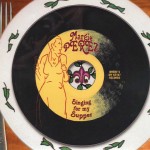 Margie Perez first released Singing for My Supper last year, but she has re-released it recently with three new songs. A big part of the fun of Perez is that she’s so sweet in person and in her delivery, but her lyrics are far randier than that persona would lead you to expect. “When I watch you move / I think, ‘What’s one night of sin?’” she sings in the new “You Ain’t the One for Me.” Those songs are set in the relaxed grooves generated by her three-piece band, and the space they create leaves room for her to help make the songs funky. Margie Perez first released Singing for My Supper last year, but she has re-released it recently with three new songs. A big part of the fun of Perez is that she’s so sweet in person and in her delivery, but her lyrics are far randier than that persona would lead you to expect. “When I watch you move / I think, ‘What’s one night of sin?’” she sings in the new “You Ain’t the One for Me.” Those songs are set in the relaxed grooves generated by her three-piece band, and the space they create leaves room for her to help make the songs funky.
The new songs are the highlights of the re-release because they show her growth as a lead singer. At times on the initial release, she’s more of a backing vocalist—spot-on, but without the distinctive sound of a frontperson. On those occasions, the space left by the three-piece band felt like an empty living room where something is needed to make it go. The tango-esque “Somebody Help Me,” on the other hand, plays with her sugary image, singing childlike “la la la”s in a song about trying to get over her ex. Her solution: “Like Uncle Sam / I need a new recruit.” Her wit and delivery there show someone in charge of her music and, it seems, her bed.
|
|
No comments:
Post a Comment